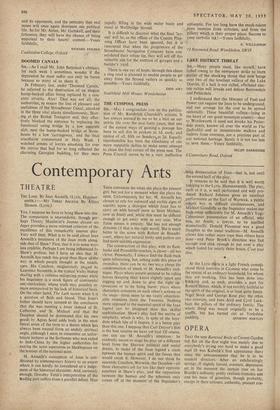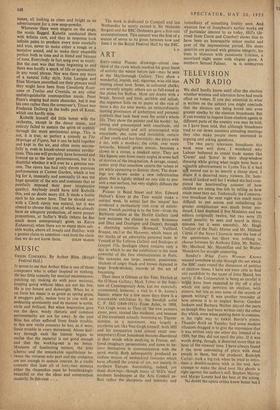OPERA
THAT the new Bartered Bride at Covent Garden fell flat on the first night was mainly due to everybody's trying too hard to make a good start (it was Kubelik's first appearance there since the announcement that he is to be musical director). After an exhilaratingly springy, if slightly forced, overture, depression set in the moment the curtain rose on Jan Brazda's tediously pretty realistic-fantastic sets and his mass of graceless, though probably, except in their cblours, authentic, peasant cos- Whenever there were singers on the stage, the music flagged. Kubelik conducted them with infinite care, and they in response took infinite pains to produce every note carefully and true, never to make either a rough or a tentative sound, and to make their ensemble perfect both in time and in blend and balance of tone. Everybody in fact sang ever so nicely. But the cost was that from beginning to end there was hardly a spark of life or spontaneity in any vocal phrase. Nor was there any trace of a natural folky style. John Lanigan and Elsie Morison smoothed out their phrases until they might have been from Cavalleria Rani- cana or Troilus and Cressida, or any other undistinguishable cosmopolitan music. Peter Pears's singing had more character, but it was his own rather than the composer's. Truest was Frederick Dalberg in the buffo part of Kecal, which can hardly miss.
Kubelik himself did little better with the orchestra, except in the dance music, and entirely failed to sustain the spirit of comedy through the more sentimental songs. This is not, it is true, so perfect a comedy as The Marriage of Figaro, but it can be held together and kept in the air, and often more success- fully is, even in knock-about amateur produc- tions. This one will probably have loosened and livened up at the later performances, but it is doubtful whether it will ever be a genuine suc- cess. The opera has had only eleven previous performances at Covent Garden, which is too big for it, musically and scenically (it was the huge quantity of the sets and costumes that so painfully exposed their poor imaginative quality). Anybody could have told Kubelik this, and no doubt many did. It made a feeble start to his career here. That he should start with a Czech opera was natural, but it was absurd to choose this one, of which we already have an adequate production, of more proper proportions, at Sadler's Wells (where he has much more enterprisingly given us Katya Kabanova), when there are so many more suit- able works, above all Jettufa and Dalihor, with a greater claim to attention—not least the claim that we do not know them. COLIN MASON











































 Previous page
Previous page